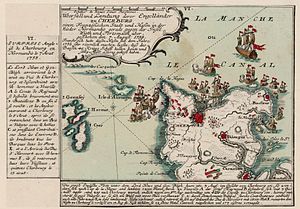
Admiral of the Fleet Richard Howe, 1st Earl Howe,, was a British naval officer. After serving throughout the War of the Austrian Succession, he gained a reputation for his role in amphibious operations against the French coast as part of Britain's policy of naval descents during the Seven Years' War. He also took part, as a naval captain, in the decisive British naval victory at the Battle of Quiberon Bay in November 1759.

Edward Hawke, 1st Baron Hawke,, of Scarthingwell Hall in the parish of Saxton with Scarthingwell, near Tadcaster, Yorkshire, was a Royal Navy officer. As captain of the third-rate HMS Berwick, he took part in the Battle of Toulon in February 1744 during the War of the Austrian Succession. He also captured six ships of a French squadron in the Bay of Biscay in the Second Battle of Cape Finisterre in October 1747.
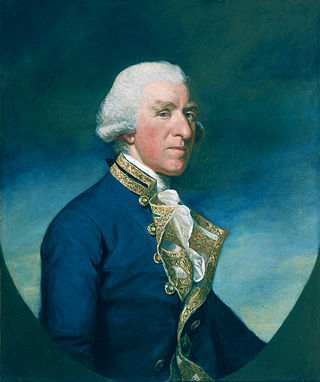
Samuel Hood, 1st Viscount Hood was an admiral in the Royal Navy. As a junior officer he saw action during the War of the Austrian Succession. While in temporary command of Antelope, he drove a French ship ashore in Audierne Bay, and captured two privateers in 1757 during the Seven Years' War. He held senior command as Commander-in-Chief, North American Station and then as Commander-in-Chief, Leeward Islands Station, leading the British fleet to victory at Battle of the Mona Passage in April 1782 during the American Revolutionary War. He went on to be Commander-in-Chief, Portsmouth, then First Naval Lord and, after briefly returning to the Portsmouth command, became Commander-in-Chief, Mediterranean Fleet during the French Revolutionary Wars. His younger brother was Admiral Alexander Hood, 1st Viscount Bridport (1726–1814), and his first cousin once-removed was Admiral Sir Samuel Hood, 1st Baronet (1762–1814).

The Anglo-Spanish War was a military conflict fought between Britain and Spain as part of the Seven Years' War. It lasted from January 1762 until February 1763, when the Treaty of Paris brought it to an end.

Vice-Admiral Sir Joshua Rowley, 1st Baronet was a Royal Navy officer who was the fourth son of Admiral Sir William Rowley. Sir Joshua was from an ancient English family, originating in Staffordshire (England) and was born on 1 May 1734. Rowley served with distinction in a number of battles throughout his career and was highly praised by his contemporaries. Unfortunately whilst his career was often active he did not have the opportunity to command any significant engagements and always followed rather than led. His achievements have therefore been eclipsed by his contemporaries such as Keppel, Hawke, Howe and Rodney. Rowley however remains one of the stalwart commanders of the wooden walls that kept Britain safe for so long.

The British expedition against Guadeloupe was a military action from January to May 1759, as part of the Seven Years' War. A large British force had arrived in the West Indies, intending to seize French possessions. After a six-month-long battle to capture Guadeloupe they finally received the formal surrender of the island, just days before a large French relief force arrived under Admiral Maximin de Bompart.

The Battle of Saint-Cast was a military engagement during the Seven Years' War on the French coast between British naval and land expeditionary forces and French coastal defence forces. Fought on 11 September 1758, it was won by the French.

The Seven Years' War (1756–1763) was a global conflict involving most of the European great powers, fought primarily in Europe and the Americas. One of the opposing alliances was led by Great Britain and Prussia. The other alliance was led by France, backed by Spain, Saxony, Sweden, and Russia. Related conflicts include the 1754 to 1763 French and Indian War, and 1762 to 1763 Anglo-Spanish War.
Lieutenant General Thomas Bligh was an Irish-born British soldier, best known for his service during the Seven Years' War when he led a series of amphibious raids, known as "descents" on the French coastline. Despite initial success in these operations, they came to an end following the disastrous Battle of St Cast.
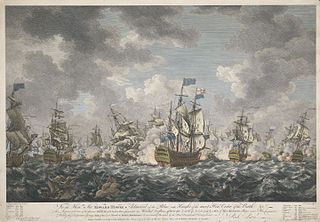
A French invasion of Great Britain was planned to take place in 1759 during the Seven Years' War, but due to various factors was never launched. The French planned to land 100,000 French soldiers in Britain to end British involvement in the war. The invasion was one of several failed French attempts during the 18th century to invade Britain.

Great Britain was one of the major participants in the Seven Years' War, which in fact lasted nine years, between 1754 and 1763. British involvement in the conflict began in 1754 in what became known as the French and Indian War. However the warfare in the European theatre involving countries other than Britain and France commenced in 1756. Britain emerged from the war as the world's leading colonial power, having gained all of New France in North America, ending France's role as a colonial power there. Following Spain's entry in the war in alliance with France in the third Family Compact, Britain captured the major Spanish ports of Havana, Cuba and Manila, in the Philippines in 1762, and agreed to return them in exchange for Spanish Florida. The Treaty of Paris in 1763 formally ended the conflict and Britain established itself as the world's pre-eminent naval power.

France was one of the leading participants in the Seven Years' War, which in fact lasted nine years between 1754 and 1763. France entered the war with the hope of achieving a lasting victory against Prussia, Britain, and their German allies and with the hope of expanding its colonial possessions.

The Raid on Rochefort was a British amphibious attempt to capture the French Atlantic port of Rochefort in September 1757 during the Seven Years' War. The raid pioneered a new tactic of "descents" on the French coast, championed by William Pitt who had taken office a few months earlier.
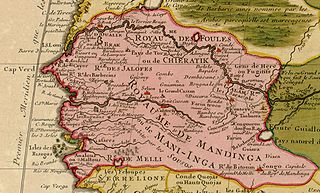
The British capture of Senegal took place in 1758 during the Seven Years' War with France, as part of a concerted British strategy to weaken the French economy by damaging her international trade. To this end, a succession of small British military expeditions landed in Senegal and captured Gorée and Fort Saint Louis, the French slave fort located at Saint-Louis, seizing French vessels and supplies. By late 1758 the whole of the French colony on the Senegalese coast had been captured by the British, with administrative matters being handled by the first British Governor of Senegal, Lieutenant Colonel Richard Worge.

The Capture of Belle Île was a British amphibious expedition to capture the French island of Belle Île off the Brittany coast in 1761, during the Seven Years' War. After an initial British attack was repulsed, a second attempt under General Studholme Hodgson forced a beachhead. A second landing was made, and after a six-week siege the island's main citadel at Le Palais was stormed, consolidating British control of the island. A French relief effort from the nearby mainland was unable to succeed because of British control of the sea. The British occupied the island for two years before returning it in 1763 following the Treaty of Paris.
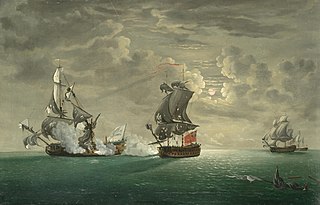
The Battle of Cartagena took place on 28 February 1758 off the Spanish port of Cartagena during the Seven Years' War. A British fleet under Henry Osborn, which had blockaded a French fleet in Cartagena, attacked and defeated a French force under Michel-Ange Duquesne de Menneville coming to their assistance.

The Invasion of Hanover took place in 1757 during the Seven Years' War when a French army under Louis Charles César Le Tellier, duc d'Estrées advanced into the Electorate of Hanover and neighbouring German states, following the Battle of Hastenbeck. French forces overran most of Hanover. This action forced the Hanoverian Army of Observation, intended to defend the Electorate, to Stade on the North Sea coast. At the Convention of Klosterzeven the Duke of Cumberland agreed to disband his army and acknowledge the French occupation of the Electorate.
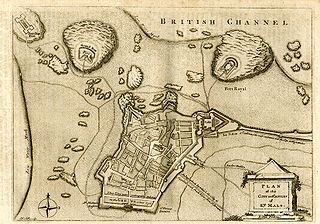
The Raid on St Malo took place in June 1758 when an amphibious British naval expedition landed close to the French port of St Malo in Brittany. While the town itself was not attacked, as had been initially planned, the British destroyed large amounts of shipping before re-embarking a week later. The naval forces were under the command of Richard Howe while the army was led by the Duke of Marlborough and Lord Sackville.
Lieutenant-Colonel Robert Clerk was a British engineer officer who served in the War of the Austrian Succession and the Seven Years' War. His report on the state of the defences of Rochefort in 1757 was the main reason for that French naval port being chosen as the target for a major British expedition, the Raid on Rochefort, for which Clerk was appointed chief engineer.

HMS Granado was launched at Harwich in 1742, during the War of the Austrian Succession as a sloop-of-war. During this war she captured a French privateer. During the Seven Years' War she served both as a sloop and as a bomb vessel, and participated in naval operations off the coast of France and in the West Indies. When the Navy sold her in 1763 she became the mercantile Prince Frederick. Around 1775 she became the whaler Prudence, sailing in the British northern whale fishery. Around 1781 she became a government transport and was wrecked on 20 May 1782 on the coast of India.
